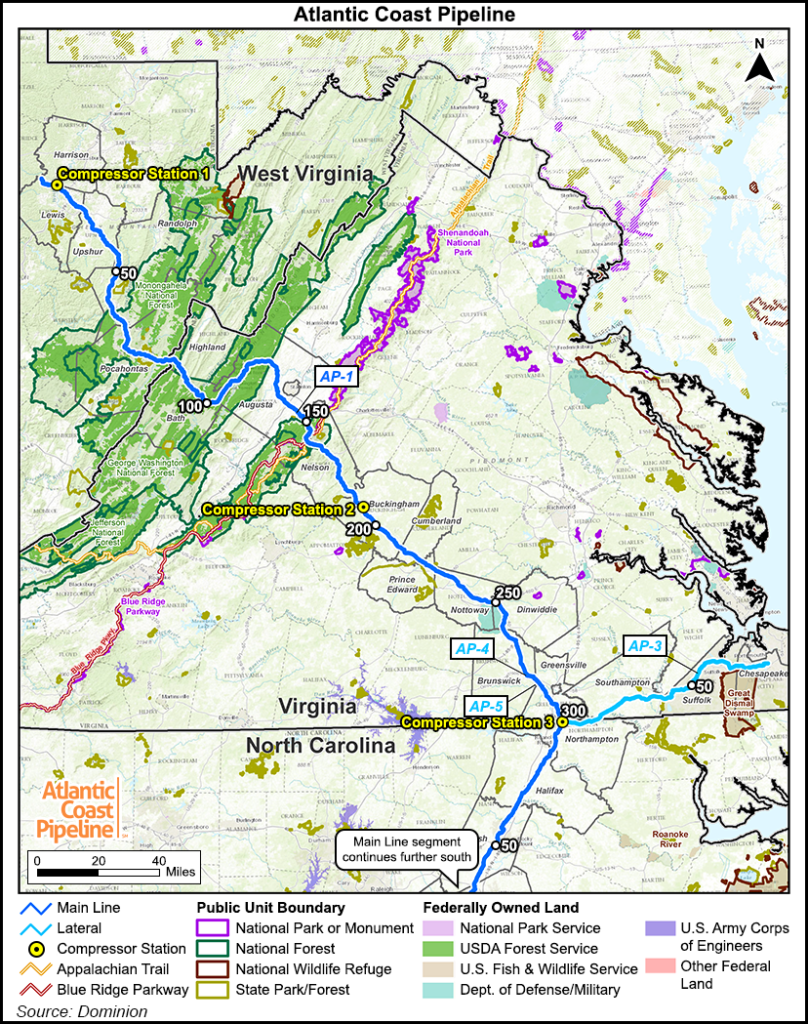Regulatory | Infrastructure | NGI All News Access | NGI The Weekly Gas Market Report
Atlantic Coast Pipeline Gets DEIS From FERC to Cap Off Busy 2016
After a lengthy review process that included a major route change, the Atlantic Coast Pipeline LLC (ACP) and related Supply Header Project (SHP) took a major step forward Friday after FERC staff released a favorable draft environmental impact statement (DEIS) for the proposed pipelines.

Federal Energy Regulatory Commission staff wrote that the “construction and operation of ACP and SHP would result in temporary and permanent impacts on the environment,” including “some adverse effects.” But FERC said through proper mitigation and avoidance “the majority of the project effects would be reduced to less-than-significant levels.”
FERC released the DEIS for public review on the last business day of 2016 and more than a year after ACP officially filed for a certificate to begin construction [CP15-554].
Proposed to supply Appalachian Basin gas to meet heating and power generation demand in the Southeast, ACP is a joint venture of Dominion Resources Inc., Duke Energy and Southern Company Gas.
Construction of the 1.5 Bcf/d ACP would include about 519 miles of 42- and 36-inch diameter pipeline in West Virginia, Virginia and North Carolina and about 85 miles of 20- and 16-inch diameter pipeline in Virginia and North Carolina. The project proposes adding new compressor stations in Lewis County, WV, Buckingham County, VA, and Northampton County, NC, as well as nine new meter stations.
SHP would feed into ACP and would be wholly owned and operated by Dominion Transmission Inc. SHP would involve construction of about 38 miles of 36-inch diameter pipeline in Pennsylvania and West Virginia and modifications to four existing compressor stations.
Dominion Energy Vice President of Pipeline Construction Leslie Hartz hailed the release of the DEIS as “a very significant milestone” in ACP’s efforts to secure federal approval.
“Among other findings, the draft report confirms that the measures proposed by Atlantic Coast Pipeline significantly reduces and mitigates the environmental impacts of the project. Additionally, the draft report reinforces previous findings by the FERC and decades of research demonstrating that natural gas pipelines do not adversely impact tourist economies or residential property values while providing a boost to economic development,” Hartz said.
“This report is the culmination of more than two years of exhaustive study and meaningful engagement with communities along the proposed route. The report draws on nearly 100,000 pages of reports and documentation submitted by Atlantic Coast Pipeline, as well as more than 35,000 public comments submitted by landowners, agencies and other interested parties to the project docket on the FERC website,” she added.
“By any measure, this has and will continue to be a thorough process. It has afforded numerous opportunities for the public to help shape the project and ensure that it is developed in an environmentally responsible manner.”
ACP aims to cross scenic and largely undeveloped terrain along the mountainous West Virginia/Virginia border, which has made it the object of impassioned opposition from environmentalists and landowners.
Meanwhile, local governments along ACP’s route have been sizing up opportunities to use the pipeline as an economic development lure.
ACP encountered a setback in early 2016 after the U.S. Forest Service rejected the pipeline’s original proposed route through the George Washington and Monongahela national forests. The prolonged environmental review eventually led to Dominion pushing back the target start-up date from late 2018 to sometime in 2019.
“We have worked constructively with landowners and agencies to address the important environmental issues that have been raised,” Hartz said. “As the draft report demonstrates, we’ve taken meaningful steps to avoid or minimize impacts and incorporate public input in many important areas of the project. Based on public input and our interactions with landowners, we’ve made more than 300 route adjustments and completed more than 250 miles of reroutes to avoid environmentally sensitive areas and many other features of individual properties. The project has improved and strengthened as a result of this constructive process.”
Opposition groups quickly responded to the release of the DEIS Friday.
Cat McCue, communications director for the environmental advocacy organization Appalachian Voices, said the DEIS “reveals that FERC has ignored evidence that the massive, expensive fracked-gas pipeline is not needed to meet demand” and that “the project’s clear threat to human life and to rural communities, the taking of private property, and the permanent environmental destruction it would cause are wholly unjustified.”
FERC said it will be accepting comments on the DEIS through April 6.
Apparently looking to clear its desk before the start of the new year, FERC also issued a final EIS Friday for the Atlantic Sunrise expansion, another pipeline project looking to bring more Appalachian Basin gas to markets in the Southeast.
© 2024 Natural Gas Intelligence. All rights reserved.
ISSN © 1532-1231 | ISSN © 2577-9877 | ISSN © 1532-1266 |
